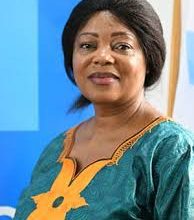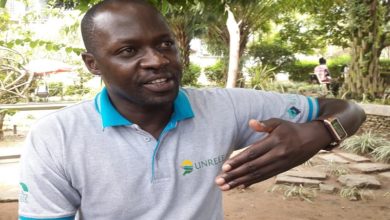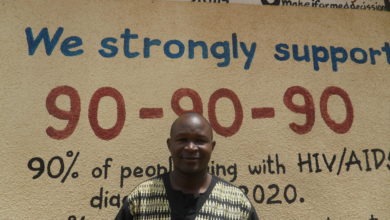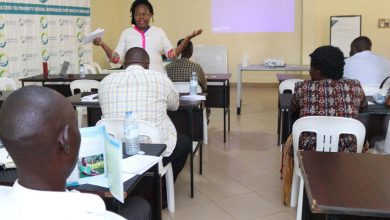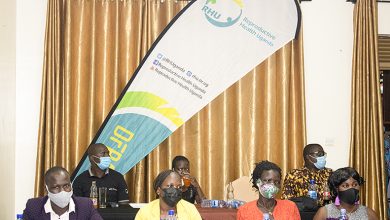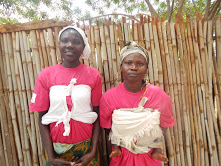
Health
UGANDA: TEENS ON MATERNITY AND THE HORROR IN THE NORTH
In the Eastern suburb of Gulu Municipality at Loroo Division in the village of Ariaga Central is Vicky Apiyo, a 21 year old teen mother of three children.
By Simon Wokorach
GULU-UGANDA: At the tender age of 14, Apiyo was forced to leave school and married off herself in an attempt for rescue upon being rejected by her own mother and only engulfs in misery than the rescue she anticipated.
“I don’t know how many clothes have washed for people to settle my bill with a traditional birth attendant after my first birth and for survival now” Apiyo recalls her painful moment.
Sitting in her grass thatched house,looking down the road with glimmer of hope with her 6 months baby girl,she waits for a footstep that would call her out for odd jobs around for a daily survival.
The era of most of the teen families in the Northern part of the Country is linked to the last 20 years of insurgency of Lord Resistant Army against the Ugandan government and domestic violence.
Subsequently after her father escaped form massacre of Atiak in 1995, he was murdered in cold blood in the village of Pacilo from Atiak Sub County when the wife was just three months’pregnant with Apiyo.
The single life out there became unbearable as Apiyo could remember and the mother had to leave her marital home and resettled back home where Apiyo was born.
Two years later upon her birth, Apiyo would recall her mother leaving her to the custodianship of her grandmother as she got married to the next man after the death of her father.
The separation of the minor then with her mother was a spark off of hell in the live and carrier of the teen mother who lives in painful memory of the wrath of the insurgency and that of the mother.
The future became clouded for the young girl in 2013 after the passing away of her grandmother and the event that followed was the horror she faces to date.
With despair and loss of confidence from denial to rejection,she sought for marriage at that tender age to rescue her but the challenges she is rounded with have outlived the usefulness of her marriage.
“My own mother had banished me to live with her just because my step father doesn’t want me to live in his home and see where I have ended now. Life has ever been hard and it is hard” Apiyo in pain.
To her dismay, the marriage she considered for her big relief is at the brink of collapse and she turns out to be sole bread winner in the family of four dependents.
The husband she initially leaned on also developed a rear health complication starting with swollen leg which later paralyzed him and remained down haplessly.
“I don’t know how many times we have slept hungry here the days I couldn’t find anything for the family and that is the life we are living now but we can still see the sun and look up in heaven” She explains.
However, one other difficult moment she recalls was the prolonged labor pain at her first delivery which then happened from home in the hand of a traditional birth attendant.
Young as she was, Apiyo had a retained placenta in her womb for more than six hours at the home of a traditional birth attendant but God had worked it out to save her.
Upon delivery in her narrative, traditional birth attendant had demanded her to give her a goat in return or 80,000 Uganda Shillings equivalent to one goat.
However, she says, the nurses at the nearby health Centre couldn’t give her the attention because she couldn’t afford to put on good clothes and that explains why she remained home until birth which nearly claimed her life.
“I was afraid to deliver at the health Centre because the nurses would always tell me to put on good clothes but I couldn’t have one for me not even what they required of me at maternity ward”She further explains.
Consequently, she had to spend six months washing peoples’ clothes and doing other odd jobs to raise money to settle her bill with a traditional birth attendant as she demanded after the delivery, the situation she describes as traumatizing since she could hardly get food on the table.
In the District of Oyam at Ngai Sub County from Lango Sub Region, Santa Ajok, the mother of three children was forced to pay a cow to a traditional birth attendant who aided her at delivery.
However, unlike her fellow,Ajok had never spared a single time for antenatal visit and remained home until birth where she narrowly escaped death from a retained placenta in the hand of a traditional birth attendant.
Following the incident, Ajok had to develop a gynecological problem which worsened her second birth until she was rushed to St. Mary’s Hospital Lacor and rescued with an operation.
“I didn’t know how I reached the hospital but I realized I was there after the operation but my in-law had to sell off a cow to meet the cost of my operation”Ajok in an interview.
However, the teen motherhood in the region doesn’t trace its origin to only the aftermath of the long armed conflict but poverty and domestic violence equally blamed for the situation.
The 20 year old Giramira Gloria and a child mother with three children from Nebbi District in West Nile Sub Region witnessed the suffering of children at the wrath of domestic violence.
At the age of 13 after her mother had separated with her father, Gloria dropped out of school and stayed with her uncle who married off her to a 32 year old man in neighborhood.
She was later abandoned by the 32 year old man after she gave birth a year later which turned her on street life for survival for sometimes until she was rescued by a Humanitarian Agency in Gulu.
“My uncle sent me back to my father but I didn’t know he has already arranged for my marriage and that is how I missed school but he had to abandon me with this child you see, It’s sad” She grieves in pain.
From Nwoya District in Alero Sub County, Monica Akello, a 21 year old mother of three has also suffered the same fate.
At the age of 14, Lawino was pulled out of school and married off also to a 32 year old man who later abandoned her with two children.
The situation of teen motherhood in Acholi Sub Region and beyond
Despite of several laws for protecting the children in place, the rate of child marriage within Acholi Sub Region is reportedly high at over 50 percent compared to a national standing at 40 percent according to 2018 report for Northern Uganda by Save the Children and the report by Gulu Regional Referral Hospital puts teen age pregnancy at 29 percent of all the deliveries at the facility.
The highest incidence was recorded in Nwoya District with 68 percent and Omoro District whereas the rate of drop out of girls from school remains high in the three Districts of Gulu at 40 percent, Amuru at 37 and Nwoya at 35.
The report further shows that about 525,000 young girls are married off in Uganda annually and that child marriage can be prevented in 1 million girls in the country by 2030 if girls are allowed to complete secondary schools.
The Uganda health demographic survey of 2016 report presented a decline in teen age pregnancy to 31 percent in 2011 which then rose higher by 25 percent in a period of 5 years.
The projection of child marriage by the World Health Organization from 2011 to 2020 is anticipated at 140 million girls with 18.5 million of them below the age of 15.
“Child marriage is an appealing violation of human rights which robes girls of their education and health” Babutunde Osotimehin, The Executive Director of United Nation Population Fund in statement.
In a similar statement, Brectje Van Lith, Save the Children Country Representative in Uganda has described child marriage as a form of child abuse which forces girls out of schools and trap them in cycle of poverty.
According to the United Nations, child marriage is a violation of Article 16 (2) of the International Declaration of Human Rights and Uganda is ranked 9th in the World hot spot for child marriage.
Maternal health in question, Gulu and far
Whereas many of the teen mothers in Gulu have survived major health complications from maternity, quite a number of them couldn’t live to see their day and just like their new born.
A Total of 25 mothers have reportedly died in Gulu District alone during delivery from July 2018 to March 2019 most of whom were young girls according to report by Gulu District Health department while still births were recorded at 93 with a total of 11,929 safe deliveries.
According to the Gynecology report at St. Mary’s Hospital Lacor, more than 43 mothers have succumbed to fistulas for the last two years.
Dr.Alobo Gastoney,a Gynecologist at St. Mary’s Hospital Lacor has attributed the highest incidence on prolonged labor pain, teen marriage and infections among others.
“Fistula is a very embarrassing disease condition and can kill when not treated early, unfortunately, we have lost more than twenty mothers at delivery as of last year alone” Dr.Alobo explains.
In Uganda according to the 2015 report by UNICEF on maternal and newborn disparities, about 4,600 births occur in Uganda everyday with 96 still births recorded on a daily basis while a total of 81 babies are reportedly dying every day before reaching their first month.
The Uganda mortality rate stands sat 19 of every 1000 live births in urban areas with highest deaths of 30 in rural areas of the same live births.
Addressing last year annual youth conference in Gulu conducted by Save the Children Uganda, Florence Nakikiwala Kiyingi and The Ugandan Minister for Youth and Children has challenged the Country to prioritize maximum protection for the girl child to complete study and break out from the poverty line.
The response against maternal and new born mortality and morbidity
Uganda is reportedly making improvements in maternal and new born health according to 2016 Uganda Demographic Survey.
However, though the report of that progress can at a certain point gain trust amongst the population of over 41 million citizens but the 336 women who die at birth of every 100,000 women still worth no celebration.
The phenomenon is reportedly higher in Northern and Eastern Uganda and is blamed on three major delays for medical attention the women are suffering from according to report by USAID on maternal and newborn financing services.
The first delay is recognition for an obstetric emergency, reaching an appropriate obstetric facility and finally receiving adequate care in the facility which poses serious threats to maternal and newborn lives.
However, as government commits to increase its visibility to promoting maternal and newborn health, the Uganda Voucher plus Activity, a USAID funded project is intending to bridge the gap in the 30 Districts in Northern and Eastern Uganda.
The 5 years project which kicked off in 2015 is expected to close in 2020 and aimed to provide safe deliveries to a total of 250,000 vulnerable mothers but its sustainability remains the key issue still unresolved.
Apiyo, the teen in Gulu is among over 120,000 women in the two hot spot regions with the highest incidence of maternal and newborn mortality have benefited from the program.
“My birth has ever been horrible and I was scared when I conceived again but I was lucky to benefit from this program and delivered from Lacor hospital” Apiyo told this new agency.
However, as Uganda commits to ending preventable maternal and newborn deaths,the teens on maternity couldn’t live their dreams but ending child marriage will save the million girls.

